七年级下英语第11单元
新目标英语七年级(下)Unit_11知识要点归纳
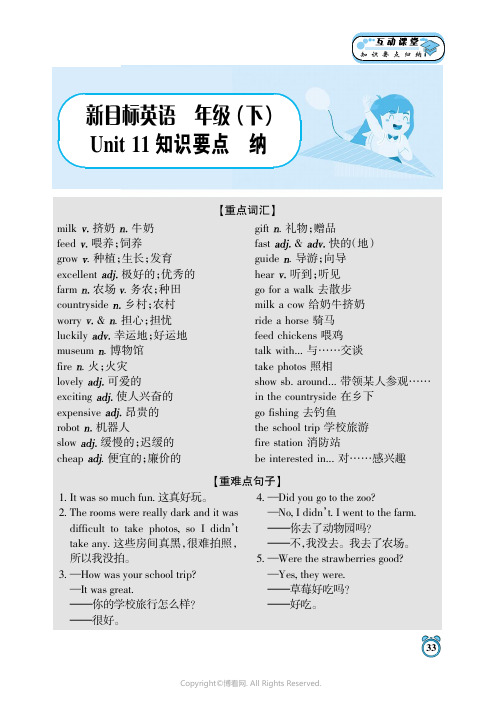
栏纳milk 挤奶牛奶feed 喂养;饲养grow .种植;生长;发育excellent 极好的;优秀的farm 农场.务农;种田countryside 乡村;农村worry &.担心;担忧luckily 幸运地;好运地museum .博物馆fire .火;火灾lovely 可爱的exciting 使人兴奋的expensive 昂贵的robot 机器人slow 缓慢的;迟缓的cheap .便宜的;廉价的gift .礼物;赠品fast &快的(地)guide .导游;向导hear 听到;听见go for a walk 去散步milk a cow 给奶牛挤奶ride a horse 骑马feed chickens 喂鸡talk with...与……交谈take photos 照相show sb.around...带领某人参观……in the countryside 在乡下go fishing 去钓鱼the school trip 学校旅游fire station 消防站be interested in...对……感兴趣1.It was so much fun.这真好玩。
2.The rooms were really dark and it was difficult to take photos,so I didn ’t take any.这些房间真黑,很难拍照,所以我没拍。
3.—How was your school trip?—It was great.———你的学校旅行怎么样?———很好。
4.—Did you go to the zoo?—No,I didn ’t.I went to the farm.———你去了动物园吗?———不,我没去。
我去了农场。
5.—Were the strawberries good?—Yes,they were.———草莓好吃吗?———好吃。
【重点词汇】【重难点句子】33Copyright ©博看网. All Rights Reserved.。
人教版七年级英语下册Unit11Howwasyourschooltrip单元复习
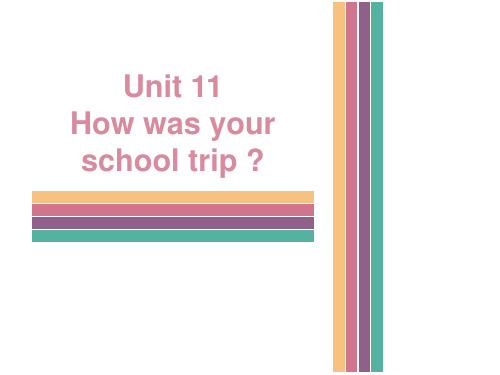
2.__ta_k_e_____ 4.__h_a_d_____ 6._r_o_d_e_____ 8.__b_u_t_____ 10.__a_______
基础复现天天练 Work seriously
●难点释疑 ①go on a school trip意为“参加学校郊 游”。如: All the students went on a school trip last week. 上周所有学生都参加学校郊游活动。 ②worry是动词,意为“担心”。常见一般 搭配为 worry about。如: You don’t need to worry about me.
目录 contents
4 主要语法
主要语法
Work seriously
四、主要语法 用一般过去时询问或描述过去事 件及关感受
★询问对过去事件的感受: 1.—How was your school trip? —It was great. ——你的学校旅行怎么样?——很好。 2.—Were the strawberries good ? —Yes, they were. ——草莓好吃吗?——是的,好吃。
Life on the farm was so much 8 .We went fishing in the early morning, went 9 a walk after
基础复现天天练 Work seriously
supper and watched the 10 at night when the weather was fine.They were very beautiful.
Have 10 nice day! Write to me if you can.
Yours, Lily
初中英语七年级下册Units 11-12知识汇总

Unit 11 How was your school trip?一单元主题分析:本单元是七年级下册第11单元,标题为How was your school trip?话题为school trips ,功能是谈论past events,属于人与自我的范畴。
本单元谈论了学校组织的游览活动,由此二本单元和其他单元之间的联系:本单元初次涉及到一般过去时态,重点讲述了一般过去时的陈述句,否定句,一般疑问句与how 引导的特殊疑问句。
而在后面的U12会继续学习一般过去时的其他特殊疑问句。
一般过去时在初中阶段时很重要的时态,为后续学习过去进行时以及现在完成时打下基础。
四单元教学目标:1.能正确使用be动词的一般过去时描述或询问过去的状态。
2. 能正确使用实义动词的一般过去时描述或询问过去发生的事情。
3.能根据动词过去式推测动词原形,尝试归纳规则动词的过去式的特点及变化规律。
4.能通过阅读本单元两篇日记理解不同人对待同一事物的不同感受.5.了解国内外学校组织的各种游览活动。
Unit 12 What did you do last weekend?一单元主题分析:本单元是七年级下册第12单元,标题为What did you do last weekend?话题为Weekend activities,功能是谈论past events,属于人与自我,人与社会的范畴。
本单元谈论了常见的周末活动,由此让学生进一步掌握一般过去式的用法,尤其是一般过去二本单元和其他单元之间的联系:本单元是七年级下册的最后一个单元,从语法上来说,从语法上来说起到了承上启下的左云初次涉及到一般过去时态,重点讲述了一般过去时的陈述句,否定句,一般疑问句与how 引导的特殊疑问句。
而在后面的U12会继续学习一般过去时的其他特殊疑问句。
一般过去时在初中阶段时很重要的时态,为后续学习过去进行时以及现在完成时打下基础。
四单元教学目标:1.能够听懂关于谈论周末活动的对话内容,培养学生提取关键信息的能力2.用带有who, where, what等特殊疑问词的一般过去时的句子询问信息,并能做出正确的回答。
人教版英语七年级下册单元Unit 11 知识点+测试卷+思维导图
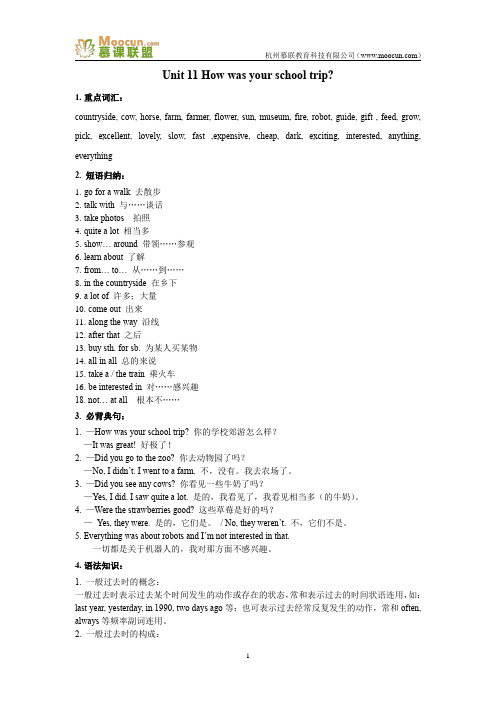
Unit 11 How was your school trip?1.重点词汇:countryside, cow, horse, farm, farmer, flower, sun, museum, fire, robot, guide, gift , feed, grow, pick, excellent, lovely, slow, fast ,expensive, cheap, dark, exciting, interested, anything, everything2. 短语归纳:1.go for a walk 去散步2.talk with 与……谈话3.take photos 拍照4.quite a lot 相当多5.show… around 带领……参观6.learn about 了解7.from… to… 从……到……8.in the countryside 在乡下9.a lot of 许多;大量e out 出来11.along the way 沿线12.after that 之后13.buy sth. for sb. 为某人买某物14.all in all 总的来说15.take a / the train 乘火车16.be interested in 对……感兴趣18. not… at all 根本不……3. 必背典句:1. —How was your school trip? 你的学校郊游怎么样?—It was great! 好极了!2. —Did you go to the zoo? 你去动物园了吗?—No, I didn’t. I went to a farm. 不,没有。
我去农场了。
3. —Did you see any cows? 你看见一些牛奶了吗?—Yes, I did. I saw quite a lot. 是的,我看见了,我看见相当多(的牛奶)。
4. —Were the strawberries good? 这些草莓是好的吗?—Yes, they were. 是的,它们是。
Unit11讲义人教版英语七年级下册
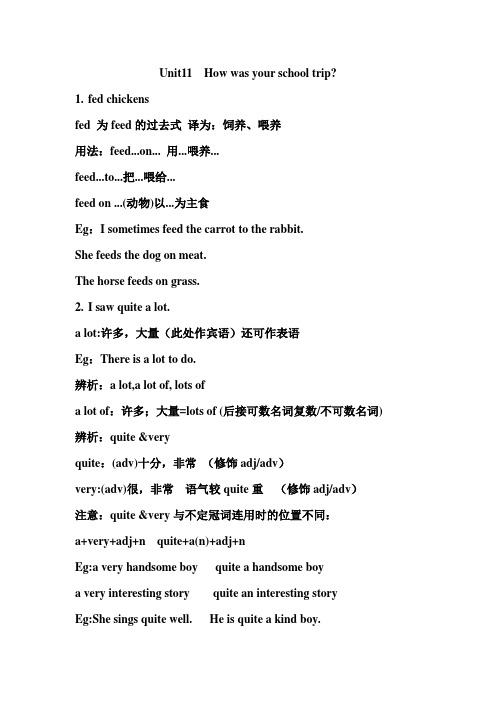
Unit11 How was your school trip?1.fed chickensfed 为feed的过去式译为:饲养、喂养用法:feed...on... 用...喂养...feed...to...把...喂给...feed on ...(动物)以...为主食Eg:I sometimes feed the carrot to the rabbit.She feeds the dog on meat.The horse feeds on grass.2.I saw quite a lot.a lot:许多,大量(此处作宾语)还可作表语Eg:There is a lot to do.辨析:a lot,a lot of, lots ofa lot of:许多;大量=lots of (后接可数名词复数/不可数名词) 辨析:quite &veryquite:(adv)十分,非常(修饰adj/adv)very:(adv)很,非常语气较quite重(修饰adj/adv)注意:quite &very与不定冠词连用时的位置不同:a+very+adj+n quite+a(n)+adj+nEg:a very handsome boy quite a handsome boya very interesting story quite an interesting storyEg:She sings quite well. He is quite a kind boy.This kind of fruit is very healthy. Thank you very much.3.Did you learn anything?辨析:anything&somethinganything:(不定代词)任何事物;某事物(常用于否定句/疑问句中) something:(不定代词)某事(常用于肯定句中) 但是在表示请求、建议、或征求意见的疑问句中常用something注意:(1)adj修饰不定代词,要位于其后(2)不定代词作主语时,谓语动词用单数形式(3)补充其他不定代词some any no every/body thing oneEg:There isn’t anything wrong.There is something wrong with my puter.4.The farmer showed Carol around the farm.farmer:(n)农民farm:(n)农场;(v)干农活farming:(不可数n)农事Eg:The farmers are working on the farm,and there is too much farming.show sb.around...带某人到处参观...Eg:The guide shows us around the museum.与show相关的短语:show sb.sth=show sth.to sb.给...看展示on show 展览show off 炫耀show up出现5.The farmers don’t grow apples.grow:(vt)种植;栽培(vi)生长;发育Eg:Farmers in the south of China mainly grow rice.Everything begins to grow in spring.短语:grow up成长,长大grow into成长为;发展成(由一种情况变成另外一种情况)Eg:I want to be a guide when I grow up.She grows into a lovely girl.辨析:grow&plantgrow: 种植(强调过程/状态)plant:(v)种植(仅表示栽入土中,表示动作)(n)植物Eg:The farmers grow a lot of trees every year.The farmers plant lots of trees every year.There are many different plants in the garden.6....we worried it would rain.worry:(vt)担心;担忧后常接宾语从句Eg:His parents worry that their child will sick.(vt)使担心;使发愁(常接sb.作宾语)Eg:The naughty boy worries his parents.worry about sb./sth.=be worried about sb./sth. 担心某人/某事Eg:Don’t worry about me ./Don’t be worried about me.7.Luckily,it didn’t,and the sun came out again.(1)luckily(adv)幸运地常用于句首,用逗号隔开unluckily不幸地unfortunately fortunate(adj)幸运的fortunately(adv)幸运地以辅音字母+y结尾的形容词变成副词的方法:改y为i再加ly Eg:happy lucky busy angry easy(2)sun moon earth star 都是世界上独一无二的事物,前面必须加the(3)e out出来;发芽;开花;出版与e相关的短语:e from来自 e on加油;快点 e back 回来e down 下来 e in 进来 e up with 提出;想出;赶上e across遇到8.expensive/cheapexpensive/cheap只能形容事物的贵贱;当谈论价格(price)时,只能用high/lowEg:The pen is cheap.=The price of the pen is low.9.All in all,it was an exciting day.all in all:总的来说;总之in a word:简言之in short:总之Eg:All in all, it’s good for you to do more exercise.辨析:all in all, in all,at allall in all:总的来说(常用于句首)eg:All in all, we had a good time. in all:总共;合计(句首/句末)eg:There are fifty students in all.at all:根本常用于“not at all”根本不Eg:He doesn’t like apples at all.与all相关的短语:all the time 一直after all 毕竟10.I didn’t like the trip at all.Not at all 用于回答感谢/道歉Eg:Thank you very much.Not at all.其它的回答:It’s my pleasure. It’s a pleasure. No problem.You’re wele. That’s all right. That’s OK.一般过去时态含义:表示过去某个时间发生的动作或存在的状态,也表示过去经常或反复发生的动作。
人教版初中英语七年级英语下Unit11全单元课件
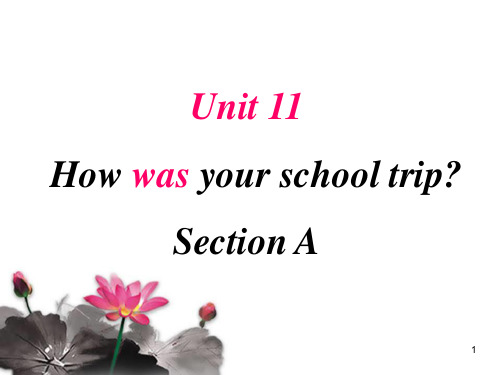
went for a walk
milked a cow
rode a horse
fed chickens
talked with a farmer took some photos
1. Did you see any cows? Yes, I did. I saw quite a lot.
quiet a lot (相当多)+of+可数或不可数, 也 可以单独使用。 quite a little 相当多+不可数名词 quite a few 相当多+可数名词
2b Listen again. Circle T for true or F for false.
1 The farmer showed Carol around the farm. T F
2 Carol learned a lot about farming. T F
3 The farmers grow strawberries from December
Did he/she......yesterday? Yes, he/she did. No,he /she didn't.
watch the stars play tennis
1b Listen and circle the three things Carol did on her school trip in 1a.
2020年6月23日
7
二、一般过去时的结构(可分三类不同的结构)
1. Be动词的一般过去时
am/is ---was are---were
(1)肯定句式:主语 + was / were + 其它.
(2)否定句式:主语 + wasn’t /weren’t+ 其它.
Unit11单元知识点归纳总结及配套练习-人教版英语七年级下册
Unit11 How was your school trip?Ⅰ. Revision(复习)Ⅱ. Presentation(重点,难点,考点,热点呈现)一般过去式1. 含义:表示动作或者状态发生在过去2.构成:肯定句:主语+动词过去式+ 其它如:I went home at nine o'clock yesterday.否定句:主语+didn't +动词原形+其它如:I didn't go home yesterday. He didn't tell me about you.疑问句:一般疑问句:Did +主语+动词原形+宾语如:Did you go home yesterday?Did you study in the school?肯定回答:Yes, I did. 否定回答:No, I didn't.特殊疑问句:特殊疑问词+did +主语+动词原型+宾语When did you finish your homework last night? What did you do the day before yesterday?3. 一般过去时态动词变化形式一般过去时态由动词的过去式表示。
大多数动词的过去式是在动词原形后加上ed构成。
这类动词称为规则动词。
1)一般情况下在词尾直接加ed。
如:play―played work―worked2)以e结尾的动词只加d. 如:like--- liked love―loved3)以辅音字母+Y结尾的动词,变Y为i,再加ed. 如:study―studied carry―carried 4)以重读闭音节结尾的动词,如果末尾只有一个辅音字母,要双写最后这个辅音字母,再加ed.如:stop―stopped5)不以ed 结尾的过去式,称为不规则动词,如:write --wrote go-went do-did have-had see-saw take-took make-made come-came buy-bought4. 标志词。
七年级下册英语第11单元笔记
七年级下册英语第11单元笔记七年级下册英语第11单元笔记一、词汇和短语1. prepare v.准备2. present v.呈现3. speech n.演讲4. audience n.观众5. apologize v.道歉6. occasion n.场合7. slight adj.轻微的8. unexpected adj.意外的9. annoy v.使烦恼10. remain v.依然存在二、重点句型1. I prepared for a long time. 我准备了很长时间。
2. I presented my speech in front of the audience. 我在观众面前呈现我的演讲。
3. I had to apologize for my slight mistake. 我不得不为我的轻微错误道歉。
4. The unexpected occasion made me feel nervous. 意外的场合让我感到紧张。
5. I was annoyed by the noise. 噪音使我感到烦恼。
6. The problem remains unresolved. 问题依然存在。
三、笔记内容本单元主要内容是关于演讲和场合的词汇和短语,同时也涉及了一些表达道歉、提出问题和给予建议的实用句型。
在这个单元中,我提前准备了很长时间,然后在观众面前呈现了我的演讲。
尽管我犯了一个轻微的错误,但我不得不为此道歉。
这个闹出意外的场合让我感到紧张。
同时我也掌握了如何表达烦恼以及问题如何依然存在的应对方式。
在下个演讲中,我会更好的准备,而噪音和其他障碍对我不会再产生烦恼。
Unit 11 单元知识点复习课件 人教版七年级英语下册
5. quite a lot 相当多;许多 ✓ quite 作副词,意为“相当;完全”。 ✓ a lot 后面不能直接跟名词,a lot of 相当于lots of,其后可接可数名词复数或不可数名词。 ✓ quite a lot意为“许多”,如果后面接名词, 则用quite a lot of。
【辨析】quite与very
walk作动词,“走路;散步”,后接地点名 词时,要加上介词to,其后接here,there,home 等地点副词时,不加介词to。
Your home is near the school, so you can walk home. We walk to school every day.
2. milked a cow 给奶牛挤奶 ✓ milk 在此处作动词,意为“挤奶”。
拓展not at all单独使用时的用法: ① 可作为当别人表示感谢的应答语,意为“不
客气;不用谢”。 — Thank you very much. — Not at all.
② 可作为别人称赞或带感谢性质的客套语,意 为“别客气”。 — It’s very kind of you. — Not at all.
含义
总的来说
all in all
总共,合计
句子位置/适用句型
常用于句首 句首或句末
in all at all
根本
常用于否定句中 not (…) at all 根本不
他们总共筹集了一万元。 They raised 10,000 yuan _i_n_a_l_l__.
总的来说,她是一位优秀的老师。 __A_ll__in__a_ll_, she is an excellent teacher.
_________ .
人教版丨七年级下册英语11单元重点句型解析(附练习题及答案)
人教版丨七年级下册英语11单元重点句型解析(附练习题及答案)Unit11 重点句型解析1. How was your trip yesterday?(1)本句为询问某事情况的常用句型,其中was是be动词的过去式,如果询问当前的情况则be动词用is。
其答语常用:It was great! (好极了) / It was OK.(还可以)/ It wasn’t good.(不好。
)/ All right.(很好。
)/ It was not bad.(还不错。
)等。
How + be+…?相当于What + be +…+ like? 例如:-How was her holiday?她的假期过得怎么样?-It was not bad. 还不错。
(2)How是疑问副词,意为“如何,怎样”,常用来引导特殊疑问句来询问方式、程度、状况等。
常用于以下交际用语中:1)How is/are +sb. ? 用来询问人的身体、工作、学习或生活等的状况。
例如:-How are you? 你好吗?-Fine, thank you. 好,谢谢。
2)How is/are +sth.?用来询问某物或者某事的状况如何。
例如:How is your work? 你的工作怎么样?3)How do you do? 并不表示疑问,是第一次见面时的问候语,回答仍用此句。
例如:How do you do? 你好!How do you do? 你好!4)How is it going?/ How is everything going? 用来询问事情进展如何。
例如:How is it going? 情况/进展如何?Very well./ Not too bad./just so so.很好。
/还不坏。
/一般吧。
2. Did you see any cows?此句是一个一般过去时的一般疑问句,用于询问过去发生的动作或事情。
句式是“Did+主语+动词原形+其他成分?”。
- 1、下载文档前请自行甄别文档内容的完整性,平台不提供额外的编辑、内容补充、找答案等附加服务。
- 2、"仅部分预览"的文档,不可在线预览部分如存在完整性等问题,可反馈申请退款(可完整预览的文档不适用该条件!)。
- 3、如文档侵犯您的权益,请联系客服反馈,我们会尽快为您处理(人工客服工作时间:9:00-18:30)。
Peter
busy/tired/bad
Eric
good/wonderful/ fantastic
saw (过去式) 1. see _____ photos 2. photo ______ (复数) bring (反义词) 3. take _______ put 4. put ________ (过去式) pouring 5. pour _______ (现在分词) wishes (复数) 6. wish _______ funny (形容词) 7. fun ________ fed (过去式) 8. feed_______ horses(复数) 9. horse ______ went (过去式) 10. go ________ did (过去式) 11. do ________ watched 12. watch______ (过去式)
去散步 去购物 去钓鱼 挤奶牛 骑马 骑自行车 喂小鸡 和某人谈话 拍照
A: How was your school trip?
B: It was great!
A: Did you go to the zoo last weekend?
B: Yes, I did.
A: Did you see any crows ?
B: Yes, I did.
A: Were the crows good?
Read the conversation and answer the questions.
Q1. How was Eric’s trip last week?
It was excellent.
Q2.What did he do? He went fishing and fed the chickens with his grandpa. Q3. How was the weather there? It was great and the air was so clean. Q4. Did Eric watch the stars at night?
5. Lucky you! 你真幸运!相当于You’re so lucky. lucky 之后的人称还可改为me, him 等。 A: There was no power at school last night. It was so dark. 昨天晚上学校停电了,漆黑一片。 B: Lucky me. I was not here. 我多幸运呀,不在那里。
7. I fed the chickens with my grandpa.我和我的爷 爷喂鸡 fed the chickens 喂鸡 “ feed … with …词组表示“用……喂……”,此时 等于“feed … on …” ,短语中feed是及物动词,其 后接人或动物名词作宾语。 e.g. A kid fed the monkey on/with a banana. 那个小孩用香蕉喂猴子。 短语feed on 中的feed为不及物动词,意思是 “以……为食,靠……为生, Cattle feed mostly on grass. 牛以草为主食。
Make a survey. Ask your partners what they did last week. Then give a reporter.
Names
Carol
How was his/ Activities she/he did her weekend?/ feeling
boring/terrible/
saw a lot of flowers
2d
Talk about the picture.
① ② ③ ④
- How was Eric’s trip last week? - Who did he visit? - What did he do on the farm? - How was the weather there?
Yes, he did.
Q5. What did Eric say about the stars? They were beautiful.
1. I saw quite a lot.我看见许多(牛)。 quite adv. 相当;完全;十分;很 She sings quite well.她唱得非常好。 quiet a lot 相当多+of+可数或不可数, 也可以单独使用。 我们喝了不少酒。 We drank quite a lot of wine. 我看到了相当多的奶牛。 I saw quite a lot of cows. 夏天我经常打网球。 I play tennis quite a lot in the summer. 不少学生迟到了。 Quite a few students were late.
2d Role-play the conversation.
Peter: Hi, Eric. How was your trip last week? Eric: It was excellent. I visited my grandparents in the countryside. Peter: Oh, nice. What did you do? Eric: I went fishing every day. And I fed the chickens with my grandpa. It was so much fun. Peter: Sounds good. How was the weather there? Eric: It was great, and the air was so clean. I watched the stars at night. They were so beautiful. Peter: Lucky you.
2c
PAIRWORK
A: What did Carol do?
B: She picked some strawberries.
A: How was your school trip? B: It was … (boring/interesting/good/great…) A: What did you do on the school trip? B: I went for a walk with my classmates.
• ___ What did the farmer say? • ___ √ What did you see?
• ___ Did you learn anything?
• ___ √ Did you ask him any questions?
• ___ Did you grow any apples?
2. Did Carol take any photos? 卡罗尔拍照片了吗?
take some photo/pictures “拍摄;摄影” take photos of sb表示“拍摄某物或人”,: That girl likes to take photos of herself with her cell phoned. 听起来不错!此句子省略了主语 it, 句子应该是 it sounds good. 此处sound为系动词,表示“ 听起来…”其后加形容词。同样用法的单词还有feel, taste, smell, look 等等,表示“摸,尝,闻,看……起来”。 This coat feels soft. 这件上衣摸起来很软。 The supper smells delicious. 晚饭闻起来很香
How was your school trip?
(Section A 2a-2d)
Period 2 section A (2a- 3a)
What did he/she do last weekend?
played volleyball played the guitar
rode a horse
talked with a farmer babysit his cousins did some washing
Retell the story .
How was your trip last week? Peter: Hi, Eric. _______ Eric: It _______ _______ my grandparents in was excellent. I visited the countryside. did Peter: Oh, nice. What _______ you do? fed the chickens Eric: I went ___________ fishing every day. And I_______ wasfun. _______ with my grandpa. It so much Sounds good How _______ was the weather there? Peter: _____________. Eric: It_______ was great and the air _______ was so clean. I _________________ were so watched the stars at night. They _______ beautiful. Peter: Lucky _______ you.
• ___ √ Do they grow apples?
• ___ Did you eat them?
• ___ √ Were they good?
2b Listen again. Circle T for true or F for false. 1 The farmer showed Carol around the farm. T F 2 Carol learned a lot about farming. T F 3 The farmers grow strawberries from December to June. T F 4 The farmers don’t grow apples. T F 5 Carol picked some strawberries and took them home. T F
